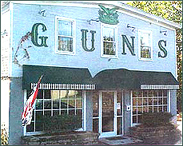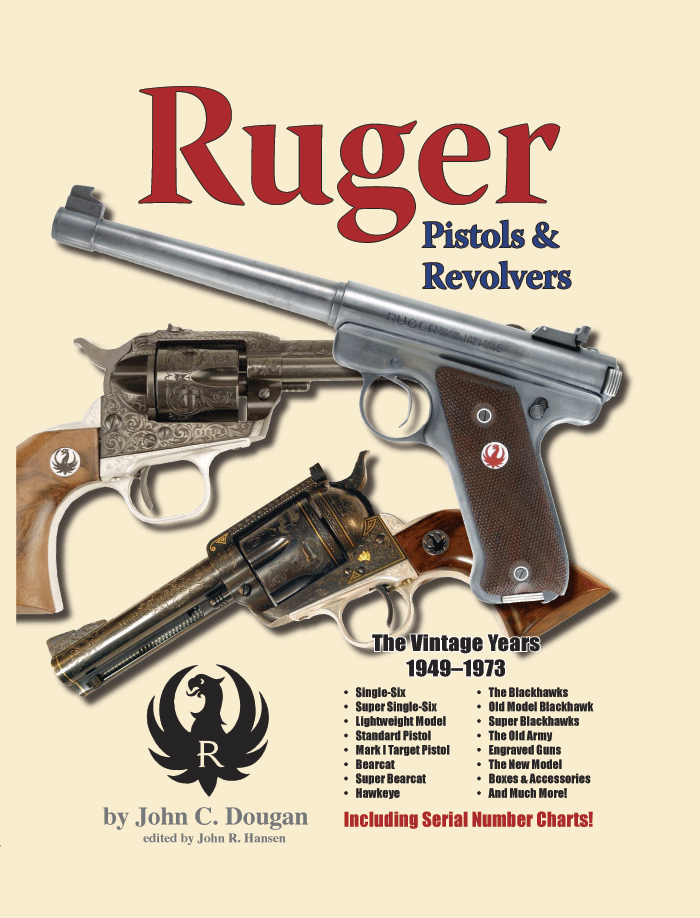|
Fine Colt Walker with 9" oct to rnd bbl, German silver front sight and 1-line left hand address. Right side of bbl lug, above wedge screw, is marked "U.S. / 1847" and the left side has the SN. The complete SN was observed on the left side of the frame, left side of bbl lug and buttstrap. Trigger guard is marked in tiny letters "COM.Y NO 204" and the cyl is marked "C COM.Y NO 204". The cyl spindle, left side of front strap under the grip and inside toe of grip are marked "204". Wedge is unmarked. Cyl is 2-9/16" long with usual six chambers and a single, crisp, serviceable safety pin. Cyl has a distinctive pressure ridge with the Dragoon/Ranger/Indian fight scene. The legends "MODEL U.S.M.R." and "COLT'S PATENT" are completely legible. Mounted with 1-pc walnut grip with the "WAT" (Capt. William A. Thornton) cartouche legible on the right side and the outline of the "NWP" (Nahum W. Patch) inspector initial on the left side. The history of the Walker revolver is somewhat convoluted and confusing. During the Mexican War Capt. Samuel Hamilton Walker was the Commander of a regiment of mounted rifleman (Dragoons) who was dissatisfied with the arms issued to his troops, namely an 1841 percussion rifle/musket and a brace of single shot flintlock or percussion pistols. In July 1846 the 2nd Regiment of Mounted Riflemen was mustered into Federal service with Capt. Walker appointed second in command with the brevet rank of Lt. Colonel. From July until October 1846 Capt. Walker participated in a number of battles in Mexico and in October 1846 departed for Fort McHenry, Maryland. Having encountered Colt Paterson repeating rifles during the Seminole Wars he was anxious to re-arm his troops with Colt's repeaters. He met with Samuel Colt in late November 1846 and together the two men re-designed the No. 5 Paterson revolver into what was to become the Walker revolver, named after Capt. Walker himself. Through a series of decisions, by the Chief of Ordnance the President and other officials(a number of whom were politically �motivated� by Samuel Colt himself), Capt. Walker was able to secured an order for 1,000 of the new revolvers. He is responsible for the numbering system found on Walker Colts today, having to do with the number of troops assigned to each company, believing at the time that company strength would be increased from the then 76 to 110 troops with each trooper being issued a pair of pistols. Since he was the Commander of "C" Company he directed Colt to number the first 220 pistols with the "C" Company designation. The increase in troop strength per company was not approved so the authorized company strength remained at 76. After the contract was secure Walker returned to Fort McHenry and continued recruiting and by Feb. 25, 1847 was in Kentucky on his way to Mexico with his troops. Between February and April 1847 Capt. Walker penned several letters to both Colt and the War Department trying to speed up delivery of the revolvers, but, unbeknownst to him, Col. John Coffee Hays had used his high rank to circumvent the shipment to Capt. Walker and secured delivery of the first Walker Colts to reach the field for his troops. These were, in fact, Walker revolvers marked "C" COMPANY which were intended for Capt. Walker's command. By that time however Capt. Walker had already been killed in Mexico. Just prior to his being killed in action Capt. Walker received a gift of a pair of Walker pistols from Samuel Colt. By the time of Capt. Walker's death the Dragoons had still not been issued revolving pistols. In the mean time in Aug. 1847 Col. Hays and his 1st Regiment of Texas Mounted Volunteers were enroute to Mexico arriving at Vera Cruz in Oct. 1847. Capt. Walker's last letter was dated "5 October 1847" stating that he had received his pair of presentation pistols and that the 220 "C" Company pistols had arrived at Vera Cruz. Capt. Walker was killed on Oct. 9, 1847 along with 18 of his troops at The Battle of Huamantla. Later in October 1847 the "C" Company revolvers were issued to Col. Hays' regiment of Texas Mounted Volunteers. At the time of the issue there were only 214 Walker pistols signed for as the records indicated six had been stolen. The Walker pistols remained in service in Mexico until the war was over serving with great effect against the Mexicans. Altogether only 500 of the original contract were ever issued in Mexico, the remaining 500 eventually returned to the U.S. By May of 1848 the War with Mexico was over and Col. Hays and his troops, on their way back to Texas, turned in 191 Walker pistols at Vera Cruz Depot, of which only 82 were still serviceable. Since Col. Hays' troops had been issued a total of 394 Walker pistols and only turned in 191, there remained 203 of the original issue either lost in battle or stolen by the soldiers to whom they were issued. It appears that the majority of those Walker Colts officially returned from Mexico, along with the second 500 of the contract wound up at the San Antonio Arsenal and in all likelihood were eventually issued to military troops and Texas Rangers fighting Indians in West Texas and New Mexico. Very few survive today in any condition and of those extremely few are in original configuration with any cylinder scene remaining or orig finish. C Co. No. 204 retains virtually all of its cylinder scene intact and we consider this one of the finest conditioned examples of a �military� Walker to be offered for sale. This revolver has descended down through the family of Joseph William Burton Edwards who was, in 1849, a Brig. General in the Georgia Militia in LaGrange, Georgia. It appears that there was a company of Georgia mounted volunteers who fought with Col. Hays' regiment and likely would have been issued Walker pistols. This fact was uncovered through the existence of Ordnance Dept. records in Washington showing attachment of militia unit to U.S. forces participating in the battle as well as documented through contemporary published book and newspaper coverage of the battle of Huamantla. While Gen. Edwards was probably in the militia at the time the Company of Georgia Volunteers left for the war and as a Brig. General would reasonably have been expected to be in command, extensive research has disclosed that it was about this time that Gen. Edwards' father had passed away and it fell to him to administer the substantial estate of a plantation of 4,000 acres along with other properties, slaves, etc. which probably precluded him leaving. During the Civil War Gen. Edwards was in command of all Confederate troops in Northwest Georgia and participated in the Battle of Griswoldville, GA, facing Sherman�s troops during his march to the sea in 1864. This revolver is accompanied by a tremendous volume of research material compiled by historian Thomas V. LoPiano, Jr. This material includes an original scarce,large ambrotype of Gen. Edwards, in uniform, probably of the 1840's period. Also included is an orig cabinet photo of Gen. Edwards taken in 1892 when he was 68 years of age. While there is no record of Gen. Edwards serving during the War with Mexico it is reasonable to accept that any one of the returning Georgia Volunteers presented this Walker pistol to Gen. Edwards(most probably at the time he was appointed brigadier gen. of Georgia militia in 1849). Also accompanied by the very rare & important original "death" issue of the Nov. 11, 1847 New York Herald Newspaper which announces the death of Capt. Walker and also specifically mentions the troop of Georgia Volunteers in same charge on Huamantla(the last known copy of this paper sold at auction in 2004 for $3,500). This furthers the probability of a connection between a member of the Georgia Volunteers and Gen. Edwards. Gen. Edwards was born in 1824 in Georgia and died in 1903 in Alabama. His daughter married James D. Carter and their daughter, Margaureta V. Carter, married Odis Clay Poundstone who was the last family member to own this revolver. It appears that Mr. Poundstone, thinking that he was fulfilling his wife's wishes, attempted to donate the revolver, in about 1967, to the Georgia Historical Commission but they, believing it was of little value, declined the donation. This date is supported by a notarized letter dated Nov. 14, 1967 by Mr. Poundstone that states "To the best of my knowledge Colt Whitneyville 'Walker' revolver, serial number 'C COMPANY 204' was a family heirloom of my wife, whose maiden name was Margaritia Victoria Carter". It appears that this fine Walker was then sold to renowned author, historian & collector, Norm Flayderman. It appeared as Item 1051 in his Catalog #79 (date unknown), two copies of which accompany this lot. This revolver was the subject of a 6-page article by historian, author & collector, Tom LoPiano, Jr.entitled �Journey Back to Georgia-a Story of a General and his Walker Colt� which appeared in the March 1983 issue of The Gun Report(copy of article available on request)and also was pictured on the cover of the referenced magazine, two copies of which accompany this lot. It appears that from Mr. Flayderman this revolver was purchased by renowned dealer & collector, Herb Glass, Sr., from whom it was purchased by Mr. LoPiano in about 1980. The research of the family history of Gen. Edwards is very extensive involving two large binders and additional separate packets of papers. This Walker also is pictured on p. 55 of The Colt Whitneyville-Walker Pistol, Whittington(which contains much of Mr. LoPiano�s documented material), whose caption states that it is a 97% probability that this revolver was one of the 214 pistols signed for by Col. John C. Hays on "19 October 1847". This is a tremendously historic and important Walker Colt in wonderful orig condition with considerable provenance and rare images and newspaper. PROVENANCE: Gen. J.W.B. Edwards Family; Norm Flayderman Collection; Herb Glass, Sr.; Tom LoPiano, Jr. Collection. CONDITION: Fine, all matching except wedge which is unnumbered. Traces of blue finish remain in the most sheltered areas being mostly a mottled silver/brown patina with light surface pitting; brass trigger guard & front strap retain a medium mustard patina; cyl is a matching silver/brown patina with distinct pressure ridge and retains virtually all original orig Dragoon/Indian fight scene with 60-70% being sharp including the �W.L.ORMSBY� signature; the "MODEL U.S.M.R." and "COLT'S PATENT" legends on the cyl are all visible with its orig safety pin mostly intact; grip is missing a chip at left heel with a few nicks & dings on bottom edges and overall retains a smooth handworn patina. Mechanics are fine, strong bore with moderate pitting. Internal loading lever latch spring is a replacement.
Offered to interested parties for sale or will consider sale/trade for "investment grade" items. Copies of all and more extensive information and images furnished to parties with serious interest by mail or in digital form (or view our website for complete details).
|



